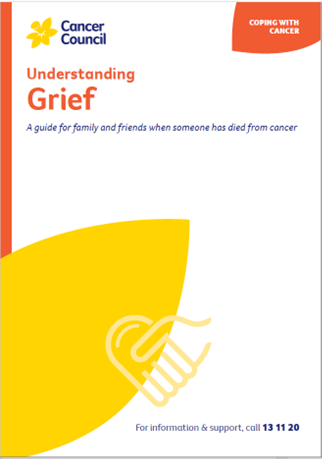- Home
- About Cancer
- Schools and teachers
- Cancer in the school community
- The bereaved school community
The bereaved school community
This section introduces a very difficult issue – one that hopefully never affects your school community. Although many people diagnosed with cancer will be successfully treated and live for many years, not everyone will recover and some people with cancer do die. There are ways to prepare if you know the prognosis is poor. The school can also support people who are bereaved.
Learn more about:
- How to prepare for a cancer death
- Action to take when someone dies
- Helping people who are bereaved
- How young people understand death
- When a student dies
- When a parent dies
- When a student’s sibling dies
- When a staff member dies
- Planning a memorial
- Seeking professional support
How to prepare for a cancer death
When a person with cancer has a poor prognosis and may not survive, your school community can plan ahead to prepare people for what might happen. This might include:
- staff and students visiting the person, if desired by their family – it may be advisable for students to go with parents or other supportive adults, and to avoid going in class time or as a class group. This can help minimise disruption to familiar routine and avoid pairing the death and the class too closely in students’ minds
- students, staff and parents continuing to communicate with the person in other ways (via emails and letters, for example)
- the principal arranging for key community members to be told of the situation and kept up to date
- staff having discussions with students about death, loss and grief.
Keep in mind that after the person dies, the school may also want to host a service, arrange a memorial prize, offer counselling and/or fundraise.
We were told to say our goodbyes, but I wasn’t ready to say it… you are not prepared for it even if you are expecting it.
– Read more of Daniel’s story
→ READ MORE: Action to take when someone dies
Podcast: Coping with Grief
Listen to more episodes from our podcast for people affected by cancer
More resources
Claire Tobin, Principal Medical Advisor, Department of Education and Training, VIC; Dr Antoinette Anazodo, Paediatric and Adolescent Oncologist, Sydney Children’s Hospital and Prince of Wales Hospital, Director of The Sydney Youth Cancer Service, and Conjoint Senior Researcher, University of New South Wales, NSW; Lisa Barrow, Clinical Nurse Educator, Children’s Cancer Centre, Royal Children’s Hospital, Melbourne, VIC; Margo Bulic, Psychosocial Support Worker, CanTeen, ACT; Amber Copeland, 13 11 20 Consultant, Cancer Council Queensland; Donna Drew, Clinical Nurse Consultant, Paediatric Oncology/Palliative Care, Kids Cancer Centre, Sydney Children’s Hospital, Randwick, NSW; Allesha Fecondo, Education Consultant, Victorian Paediatric Rehabilitation Service, and Education Liaison, Ronald McDonald Learning Program, Ronald McDonald House Charities Australia, VIC; John Friedsam, General Manager of Divisions, CanTeen Australia, NSW; Pina Hutcheson, President, Catholic Primary Principals’ Association of WA; Cara Irvine, Year 8 Coordinator, Alfred Deakin High School, ACT; Andrew Long, Assistant Director, Policy and Research, Independent Schools Council of Australia, ACT; Dr Alistair Lum, Post-doctoral Research Fellow – Behavioural Sciences Unit, Sydney Children’s Hospital, University of New South Wales, NSW; Kristine Luszczynski, Learning Program Manager, Quality and Standards, Ronald McDonald House Charities Australia, NSW; Anita Neville, National Manager, Ronald McDonald Learning Program, Ronald McDonald House Charities Australia, VIC; NSW Department of Education, NSW; Mandy Roney, Consumer; Shannon Rush, Primary School Program Manager, Camp Quality, SA; Luke Wade, Education and Career Support Consultant, Redkite, QLD.
View the Cancer Council NSW editorial policy.
View all publications or call 13 11 20 for free printed copies.
Need to talk?
Support services
Coping with a loss from cancer?
Speak to a health professional or to someone who has been there, or find a support group or forum
Work and cancer
Information for employees, employers and workplaces dealing with cancer
Cancer information
What is grief?
Common grief reactions, such as sadness, anger, relief and fear
Workplace fact sheet: Death and bereavement
Information for employers when a staff member dies or is bereaved

